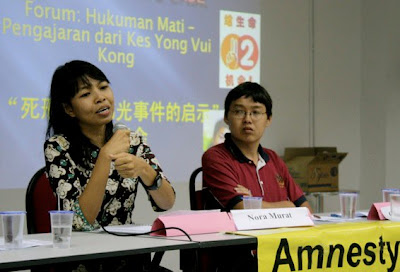A public forum titled "Lessons Learnt From Yong Vui Kong's Case" was held at the Penang Han Chiang College on Sunday 22 Aug 2010 at 8.00pm. The organisers were Suara Rakyat Malaysia (SUARAM) Penang and Amnesty International Malaysia. The forum was attended by about 60 people. A large portion of the audience were young people in their 20’s and early 30’s.
Part of the audience.
Book sale
The panelists and Dr. Toh Kin Woon (second from left) chairing the forum.
The 3 panelists were Ms. Nora Murat (Executive Director, Amnesty International Malaysia), Clement Ong (Human Rights Committee, Bar Council Malaysia) and Choo Chon Kai (Secretariat, Suara Rakyat Malaysia, Penang). The forum moderator, Datuk Dr. Toh Kin Woon started the forum by giving a brief account of the life of Yong Vui Kong, the events leading to his arrest for heroin possession and his subsequent charge and death sentence in Singapore. Dr. Toh raised 2 questions: does Vui Kong deserve a second chance in life and whether Man has the power over God to end another human being’s life?
Nora Murat (left) from Amnesty International
Ms. Nora Murat pointed out that the global trend is to say no to capital punishment. Nearly two thirds (129) of the countries in this world have already said no to the death penalty. In Dec 2008, the United Nations General Assembly passed a resolution calling for a moratorium on the use of death penalty. Nora said that capital punishment is a state murder and it is not right to legalise a murder. Everyone has a right to life and capital punishment is a cruel and inhumane way to punish wrong doers. She pointed out that statistics have not shown that the death penalty has caused a drop in serious criminal offences. Nora pointed out that the death penalty is class bias as most of those executed were predominantly from the lower strata of society.
Clement Ong (left) from Bar Council
(All photo credits: SUARAM Penang.)
Clement Ong shared information on death sentences. In 2006, 94% of the death penalty executions came from 4 countries; China, Iran, Iraq and the US. In Malaysia, data on death penalties and executions are shrouded in secrecy. It was reported in Parliament that between 1981 and 2005, there were a total of 358 executions carried out. Between 2004 and 2009, there were 52 death sentences out of which 33 were drug related cases and 19 for murders. There were 173 prisoners in death row as of Dec 2005.
Chon Kai from SUARAM Penang.
Chon Kai shared the origin of death penalty in history. He said that the death penalty is usually used to maintain order by the upper class over the lower class. He pointed out that while Singapore condemns drug taking, she is one of the largest trading partner with Myanmar which is one of the biggest producer of opium and other drugs in the region. During the Q&A session, a senior lawyer pointed to a section of the book “Once a Jolly Hangman: Singapore’s Justice In The Dock” by Alan Shadrake where the author suggests that the Singapore government succumbs to political and economic pressures in meting out the death penalty. He said that Singapore’s clemency decision is politically and economically motivated. Singapore uses criminal defamation laws to silence critics of the government policies.
Another young speaker from the floor called for all those on death row to be given a chance to rehabilitate.
A speaker from the floor is of the opinion that hard core killers and psychopaths cannot be rehabilitated. He pointed to a list of murderers who were released to murder again. (Check this link here)
Another participant asked why is Amnesty International Malaysia (AIM) taking up Vui Kong’s case in Singapore when Malaysia still has many prisoners in death row. Nora explained that Vui Kong’s lawyer, M. Ravi who is a well known human rights lawyer in Singapore took up this case on a pro bono basis. Ravi has exhausted all possible avenues to get clemency for Vui Kong and he had approached AIM for help. Nora assured the audience that it is Amnesty International’s stand to abolish the death penalty and AIM will continue to push for this even after Vui Kong’s case.
The forum ended with an announcement that a total of 96,622 signatures have so far been collected for the petition to ask for clemency for Yong Vui Kong. This is just short of the targeted 100,000 signatures. A total of 40,138 signatures were collected in Sabah, 25,112 in West Malaysia, 2200 in Singapore and 29,172 from on-line. Among the signatories were 44 Malaysian MP’s and 15 Senators. The petition and signatures will be handed over to President SR Nathan of Singapore on 24 Aug 2010 at his residence.
(All photo credits: SUARAM Penang.)

















0 comments:
Post a Comment